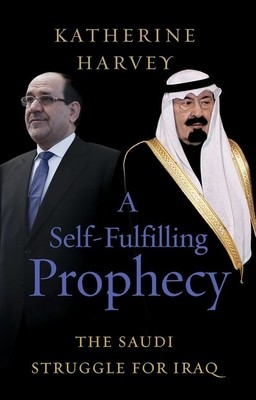
- We will send in 10–14 business days.
- Author: Katherine Harvey
- Publisher: Oxford University Press, USA
- ISBN-10: 0197631320
- ISBN-13: 9780197631324
- Format: 14.8 x 22.3 x 3.8 cm, kieti viršeliai
- Language: English
- SAVE -10% with code: EXTRA
Reviews
Description
In recent years, the geopolitical rivalry between Saudi Arabia and Iran has dominated the headlines. Many have charted the polarization between a Saudi-led Sunni camp and an Iranian-led Shia one, assuming that a predominantly Shia state like Iraq would automatically ally with Iran. In this
compelling account, Katherine Harvey tells a different story: Iraq's alignment with Iran was not a foregone conclusion. Rather, Saudi efforts to undermine Iran have paradoxically empowered it.
Harvey investigates why the Saudis refused to engage with Iraq's post-2003 Shia-led government, despite continual outreach by Iraq's new leaders and considerable pressure from the United States. She finds that certain deeply ingrained assumptions predisposed Saudi leaders to see a Shia-led Iraq as
naturally beholden to Iran: the view that Iran is inherently expansionist, and the belief that Arab Shia tend to be loyal to it. This outlook was simplistic, even downright inaccurate; and, in refusing to engage, the Saudis created a self-fulfilling prophecy. As Harvey demonstrates, members of
Iraq's new government initially sought to establish a positive relationship with Saudi Arabia, and to pursue a course independent from Iran. But, isolated and rejected by Saudi King Abdullah, Iraq ultimately had nowhere else to turn.
EXTRA 10 % discount with code: EXTRA
The promotion ends in 22d.13:10:22
The discount code is valid when purchasing from 10 €. Discounts do not stack.
- Author: Katherine Harvey
- Publisher: Oxford University Press, USA
- ISBN-10: 0197631320
- ISBN-13: 9780197631324
- Format: 14.8 x 22.3 x 3.8 cm, kieti viršeliai
- Language: English English
In recent years, the geopolitical rivalry between Saudi Arabia and Iran has dominated the headlines. Many have charted the polarization between a Saudi-led Sunni camp and an Iranian-led Shia one, assuming that a predominantly Shia state like Iraq would automatically ally with Iran. In this
compelling account, Katherine Harvey tells a different story: Iraq's alignment with Iran was not a foregone conclusion. Rather, Saudi efforts to undermine Iran have paradoxically empowered it.
Harvey investigates why the Saudis refused to engage with Iraq's post-2003 Shia-led government, despite continual outreach by Iraq's new leaders and considerable pressure from the United States. She finds that certain deeply ingrained assumptions predisposed Saudi leaders to see a Shia-led Iraq as
naturally beholden to Iran: the view that Iran is inherently expansionist, and the belief that Arab Shia tend to be loyal to it. This outlook was simplistic, even downright inaccurate; and, in refusing to engage, the Saudis created a self-fulfilling prophecy. As Harvey demonstrates, members of
Iraq's new government initially sought to establish a positive relationship with Saudi Arabia, and to pursue a course independent from Iran. But, isolated and rejected by Saudi King Abdullah, Iraq ultimately had nowhere else to turn.


Reviews